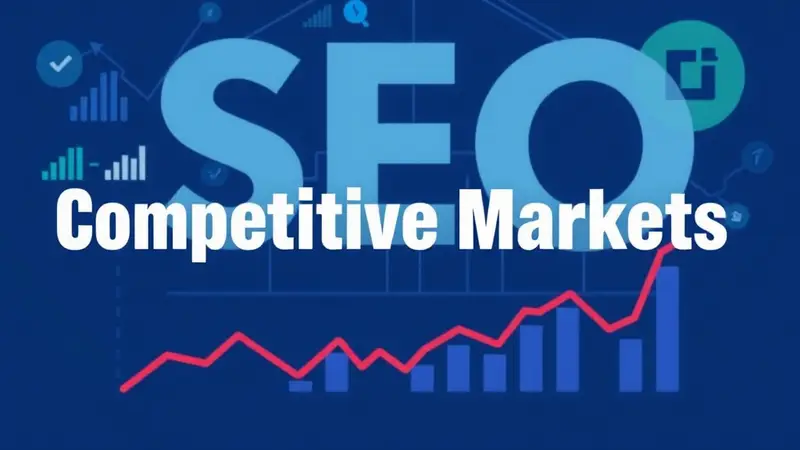Trends You Can’t Afford to Ignore
As we approach 2025, businesses need to stay ahead of the curve. Small business owners, entrepreneurs, and marketers must adapt to the evolving SEO trends to remain visible and competitive in the digital marketplace. The search engine algorithms that dictate rankings are becoming more sophisticated, user behaviors are changing, and new technologies like artificial intelligence (AI) are reshaping how we approach SEO.
This article dives deep into the SEO trends we expect to dominate in 2025. By understanding these trends and adjusting your strategy, you can future-proof your SEO efforts and stay ahead of the competition.
The Evolution of SEO
To understand where SEO is going, it’s crucial to understand where it’s been. Over the past decade, we’ve seen SEO evolve from a keyword-focused practice to a more user-centric approach that prioritizes content quality, mobile optimization, and user experience.
SEO in the 1990’s-2010’s: A Look Back
In the early days, SEO was heavily focused on keyword stuffing, link building, and other tactics designed to manipulate search engine rankings. Back then, search engines weren’t as adept at understanding context or user intent. Businesses could achieve high rankings simply by stuffing their content with the right keywords and acquiring as many backlinks as possible, regardless of quality.
However, the introduction of Google’s Panda (2011), Penguin (2012), and Hummingbird (2013) algorithm updates began the shift toward a more user-centered approach. Panda penalized low-quality content, Penguin targeted spammy backlinks, and Hummingbird focused on understanding search intent. These changes emphasized content quality, relevance, and user satisfaction over manipulative tactics.
The Current SEO Landscape (2024)
In 2023, SEO is more complex than ever. Google’s algorithms have become incredibly sophisticated, using AI and machine learning to understand context and user behavior better. SEO is no longer just about keywords; it’s about delivering meaningful content that provides value to the user. Factors like Core Web Vitals, mobile-first indexing, and voice search optimization are now critical to ranking well.
But as we look toward 2025, SEO will continue to evolve, driven by advancements in technology, changes in user behavior, and the need for businesses to adapt to an increasingly digital world.
AI and Machine Learning Will Transform SEO
Artificial Intelligence (AI) is already a significant factor in SEO, with Google’s RankBrain, introduced in 2015, using AI to interpret search queries. By 2025, AI and machine learning will play an even bigger role in how search engines function and how businesses optimize their content.
What to Expect:
- Content Creation Powered by AI: AI tools for content creation are becoming more advanced, enabling marketers to generate high-quality content quickly. While AI-generated content will play a bigger role, human creativity and insight will still be critical for developing unique, value-driven content that resonates with users.
- Smarter Search Algorithms: As search engines use machine learning to understand context and semantics, SEO will become more focused on user intent. Rather than optimizing for specific keywords, businesses will need to optimize for broader themes and concepts, ensuring their content answers users’ questions and solves their problems.
- Personalized Search Results: AI will continue to enhance personalization in search results, meaning users will see different results based on their search history, location, and preferences. Businesses will need to focus on creating personalized content that speaks to different segments of their audience.
Actionable Tips:
- Invest in AI-driven SEO tools for keyword research, competitor analysis, and content optimization.
- Focus on creating content that satisfies user intent rather than stuffing it with specific keywords.
- Personalize content where possible, tailoring it to the preferences and behaviors of your target audience.
Voice Search and Conversational AI Will Surge
With the rise of voice assistants like Google Assistant, Alexa, and Siri, voice search is becoming a major component of SEO. By 2025, it’s expected that nearly half of all online searches will be conducted through voice.
What to Expect:
- Natural Language Optimization: Voice search queries tend to be longer and more conversational than typed queries. For example, instead of typing “best lawn mowing service,” users might ask, “What is the best lawn mowing service near me?” Optimizing for these natural, conversational queries will be critical.
- Long-Tail Keywords Will Be Key: Voice search queries are often more specific and longer than typed queries. This shift means long-tail keywords will become even more important for capturing voice search traffic.
- Conversational AI Integration: Digital assistants are getting smarter and more adept at answering complex questions. Businesses will need to ensure that their content is structured in a way that can be easily understood and used by conversational AI.
Actionable Tips:
- Optimize your content for natural language queries and focus on long-tail keywords.
- Ensure your website is mobile-friendly, as voice searches are often conducted on mobile devices.
- Create content that answers specific questions concisely to improve your chances of appearing in voice search results.
Core Web Vitals and User Experience Will Be Essential
Google’s Core Web Vitals, introduced in 2021, measure key aspects of user experience, such as page loading speed, interactivity, and visual stability. By 2025, these metrics will be even more important in determining search rankings.
What to Expect:
- Mobile-First Indexing as Standard: Mobile-first indexing, where Google primarily uses the mobile version of a site’s content for ranking and indexing, will be the default by 2025. Ensuring your website is fully optimized for mobile devices will be crucial.
- Page Experience Will Become a Top Ranking Factor: Factors like fast loading times, ease of navigation, and visual stability will play a significant role in determining how websites rank. Sites that provide a poor user experience, such as slow loading speeds or elements that shift unexpectedly, will be penalized.
- Visual Stability Will Be Key: A site’s layout needs to be stable, with minimal content shifts as the page loads. Google will penalize websites with poor visual layouts or content that moves unexpectedly, disrupting the user experience.
Actionable Tips:
- Use tools like Google PageSpeed Insights to regularly audit your website and improve Core Web Vitals scores.
- Ensure your website is mobile-friendly and optimized for speed and usability.
- Simplify navigation and avoid intrusive elements like pop-ups that may negatively impact the user experience.
E-A-T (Expertise, Authoritativeness, Trustworthiness) Will Be Critical
Google has been placing increasing importance on E-A-T (Expertise, Authoritativeness, and Trustworthiness), especially for content related to health, finance, and legal topics. By 2025, E-A-T will play an even more critical role in determining search rankings.
What to Expect:
- Greater Emphasis on Content Expertise: Google will continue to reward websites that demonstrate authority and expertise in their respective fields. Businesses that create well-researched, authoritative content will see higher rankings.
- Trustworthiness as a Ranking Factor: Trustworthiness goes beyond content quality; it also includes factors such as site security (HTTPS), user reviews, and verifiable information. Websites that appear more trustworthy to users will rank higher in search results.
- Content Audits Will Be Essential: As Google’s algorithms become more sophisticated, regularly auditing and updating your content will be necessary to ensure it remains accurate, trustworthy, and relevant.
Actionable Tips:
- Create detailed author profiles that highlight the expertise and credentials of your content creators.
- Build your site’s authority by earning high-quality backlinks from reputable sources.
- Regularly update your content to ensure it remains relevant and aligned with the latest best practices.
Zero-Click Searches Will Continue to Rise
Zero-click searches, where users get the information they need directly from the search results without clicking through to a website, are becoming increasingly common. This trend is expected to grow by 2025, especially with the continued rise of featured snippets and answer boxes.
What to Expect:
- Featured Snippets Will Be Key: Featured snippets, where Google provides a brief answer to a user’s query at the top of the search results, will continue to grow in importance. Securing these spots will be critical for businesses looking to maintain visibility in zero-click search environments.
- Fewer Organic Clicks: As more users find the information they need directly in the search results, organic click-through rates will continue to decline. Businesses will need to find new ways to drive traffic and engagement.
- Increased Competition for Top Spots: As zero-click searches rise, competition for featured snippets and other prime search result spots will intensify.
Actionable Tips:
- Structure your content with concise answers to common queries to increase your chances of appearing in featured snippets.
- Use schema markup to help search engines understand and display your content in rich results.
- Focus on brand-building and other channels (such as email marketing and social media) to reduce reliance on organic traffic.
Video SEO and Visual Search Will Dominate
Video content has been on the rise for years, and by 2025, it will be a dominant form of online content. Search engines are placing more emphasis on video content, and businesses that aren’t producing video will miss out on valuable traffic.
What to Expect:
- Video Content Will Be Prioritized: Search engines will increasingly rank video content alongside traditional web pages. Businesses that invest in video content will see greater visibility and engagement.
- Visual Search Will Grow: Visual search, where users search using images instead of text, is expected to grow in importance, especially for e-commerce and retail. Businesses will need to optimize their images and videos to take advantage of this trend.
Actionable Tips:
- Create high-quality video content that is optimized for search engines by using relevant tags, descriptions, and transcripts.
- Optimize your images and videos with descriptive alt text and file names to improve visibility in visual search results.
- Incorporate video content across your website to engage users and improve SEO performance.
Fictional Case Study: John’s Lawn Mowing Business
John’s Challenge:
John runs a small lawn mowing business in his local area. Despite his efforts to maintain a strong online presence, his website traffic stagnated in 2023, and new client inquiries slowed. Recognizing the need to adapt to the changing SEO landscape, John decided to future-proof his business by implementing the latest SEO trends.
John’s Strategy:
To prepare for 2025, John focused on three key SEO trends: video SEO, voice search optimization, and AI-powered tools.
- Video SEO: John began creating video content showcasing his lawn care services, tips for maintaining healthy lawns, and before-and-after transformations of his clients’ yards. He optimized these videos with the right tags, descriptions, and keywords.
- Voice Search: Understanding that more people were using voice search to find local services, John revamped his website content to include natural language that matched how people spoke to digital assistants. He optimized his content for long-tail keywords like, “What’s the best lawn mowing service near me?”
- AI Tools: John invested in AI-driven SEO tools to help with keyword research, competitor analysis, and content planning. These tools provided insights into trending lawn care topics that helped John create content that resonated with his audience.
The Results:
By 2025, John’s website traffic increased by 40%, with many of his new clients coming from voice search users looking for local lawn care services. His video content ranked well on both Google and YouTube, becoming a major traffic driver. As a result, John was able to expand his business, hire more staff, and service more neighborhoods.
Conclusion
As we approach 2025, the future of SEO is set to be defined by AI, voice search, user experience, and video content. Small businesses that want to remain competitive must adapt to these trends and focus on creating high-quality, user-centric content that delivers value. By staying on top of these changes and optimizing for the latest SEO best practices, you can future-proof your business and continue to grow in an increasingly digital world.
Suggested Action Steps:
- Invest in AI-powered SEO tools for more efficient content optimization and keyword research.
- Ensure your website is mobile-optimized and meets Google’s Core Web Vitals standards.
- Create video content that is optimized for search engines and engages your audience.
- Optimize for voice search by using natural language and focusing on long-tail keywords.
- Regularly audit and update your content to meet E-A-T standards and maintain relevance.







